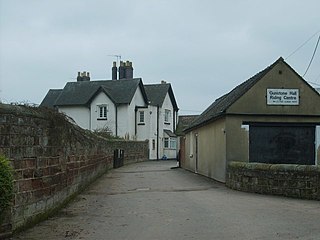Related Research Articles

General William Henry Kerr, 4th Marquess of Lothian was a Scottish nobleman, British soldier and politician, the eldest son of William Kerr, 3rd Marquess of Lothian. He was styled Master of Jedburgh until 1722, Lord Jedburgh from 1722 to 1735, and Earl of Ancram from 1735 to 1767. As the Earl of Ancram, he distinguished himself during the War of the Austrian Succession.
General Sir Charles Howard KB, styled The Honourable from birth, was a British soldier and politician.

Lieutenant General Thomas Fowke, also spelt Foulks, circa 1690 to 29 March 1765, was a British military officer of the 18th century. He was Governor of Gibraltar from 1753 to 1756, and twice court-martialled during his service.

Lieutenant General Humphrey Bland was an Irish professional soldier, whose career in the British Army began in 1704 during the War of the Spanish Succession and ended in 1756.

General Sir Charles Wills was a professional soldier from Cornwall, who was Lieutenant-General of the Ordnance and Member of Parliament for Totnes from 1718 to 1741.
Lieutenant-General Alexander Irvine or Irwin was a British Army officer.
John Wynyard was an officer of the British Army.
General Gervais Parker was a British Army officer. For the final decade of his life he served as Commander-in-Chief of the Royal Irish Army during the reign of George II.
Major-General John Grey was an officer of the British Army.

Brigadier-General Thomas Paget was a British Army officer and politician who sat in the House of Commons from 1722 to 1727. He was the ancestor of the Paget family, Marquesses of Anglesey.
Brigadier-General William Newton was an officer of the British Army.
Lieutenant-General William Barrell was an officer of the British Army.
Major-General John Price was an officer of the British Army.
Lieutenant-General Edward Pole was an officer of the British Army.
Lieutenant-General John Folliot or Folliott was an officer of the British Army.
Lieutenant-General Thomas Howard was an officer of the British Army and the ancestor of the family of the present Earls of Effingham.
Major-General Charles Jefferyes was an officer of the British Army.
Major-General John Moyle was an officer of the British Army.
Major-General Richard O'Farrell was an officer of the British Army.
Lieutenant-General Thomas Meredyth or Meredith, of Chelsea, Middlesex, was an Irish officer of the British Army and a politician who sat in the Parliament of Ireland from 1703 to 1719 and as a Whig in the British House of Commons from 1709 to 1710..
References
- 1 2 3 4 5 Charles Dalton, English Army Lists and Commission Registers 1661-1714, vol. 6 (1904) p. 66, n. 11.
- 1 2 Army List for 1740, p. 16.
- ↑ Dalton, English Army Lists, p. 363.
- ↑ Dalton, English Army Lists, p. 65.
- ↑ "No. 8042". The London Gazette . 18–22 August 1741. p. 1.
- ↑ Richard Cannon, Historical Record of the Eleventh, or the North Devon Regiment of Foot (1845) p. 33.
- ↑ Cannon, North Devon Regiment, p. 34.
- ↑ Buried at St James, Westminster, on 3 October 1747. Source: The Register of Marriages (and Burials) belonging to St James's Westminster. 1723-1754. 3 October 1747.
- ↑ "Person Page". www.thepeerage.com. Retrieved 1 January 2020.
- ↑ Burke, Bernard; Fox-Davies, Arthur Charles (1 January 1912). A genealogical and heraldic history of the landed gentry of Ireland. Dalcassian Publishing Company.